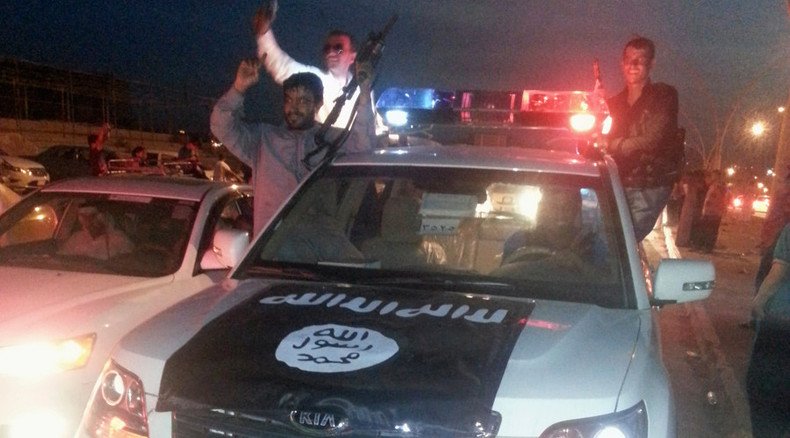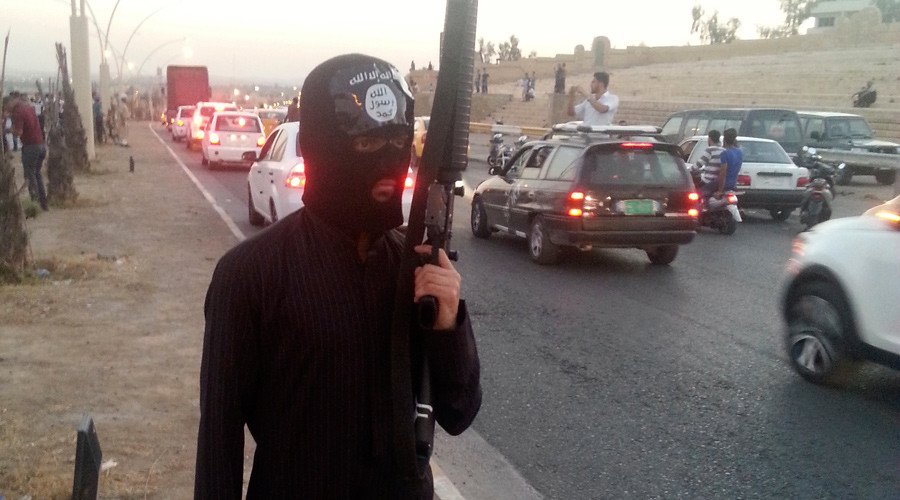‘Red line’: ISIS possibly armed with chemical weapons

Islamic State acquiring chemical weapons would be a disturbing development and if becomes a reality the group might become top priority for most actors in the region and in the West, says Brian Levin, director of the Centre for the Study of Hate and Extremism.
RT: A Pentagon official has confirmed that Peshmerga forces operating in Iraq were attacked with rockets filled with chlorine gas. So, apparently Islamic State [formerly ISIS/ISIL] is using chemical weapons now. How concerning is this?
Brian Levin: It’s a significant concern and this is not the first time we have heard about its use in this conflict. The Assad regime is alleged to have – and there are indications that it has – used chemical weapon outside of Damascus against civilians and “60 Minutes” did a documentary on that. We’ve also seen earlier this year Peshmerga alleging that they captured 20 canisters from the back of an [ISIS] truck as well. So this is a very disturbing evolution or devolution of this conflict.
RT: It's actually not the first report of Islamic State using chlorine – which could mean it has a supply of it. Where could the extremists get chemical weapons?
BL: Great question. Here’s the thing: One hundred years ago we saw chlorine gas being used in WWI and 10 years later the Geneva protocols outlawed their use. Chlorine gas in particular can be devastating. About 1 million soldiers in WWI were affected by chlorine gas and other gases and about 90,000 were killed. This is a very disturbing development and chlorine in particular has uses in industry and in household products, so chlorine is a much more accessible type of chemical agent than some of the others that are out there, which is why they are being used.
READ MORE: British forces at risk of ISIS chemical attack
RT: Russia has already promised to continue its support of the Iraqi government in the fight against terrorism. How important is international cooperation?
BL: International cooperation is key and we are hearing murmuring that there is perhaps the development of some kind more broad coalition to actually consider sending ground troops in. This is a kind of murmuring we are hearing. Hussein Ibish, who is on our board, and also writes about the Middle East, wrote how [ISIS] has been a second priority for most of the actors in the region and in the West and it might be that it is going to become a first priority, particularly if the use of chemical weapons becomes more widespread. This is a red line and we are right at it.
RT: Russia insists a broader coalition of ground troops, including Syrian government forces and air campaigns are needed to destroy Islamic State. Do you think this is the right move?
BL: That’s a military question, but increasingly as we saw [retired US Army Chief of Staff Gen. Raymond Odierno] talking just recently about putting American advisors in, the direction is going that way. The risk is that’s exactly what [ISIS] wants, and we could get involved in a very entrenched ground campaign where they brought a coalition of nations who may not be desirous to be part of it. It really depends on military strategy, as well as politically. If there is a coalition, will it be able to withstand some bruising battles done by folks who do not adhere to the Geneva Conventions and other rules of war? That is going to be the true test.

RT: Sergey Lavrov even met with the main Western-backed Syrian opposition group, which is a rare occasion. However, the opposition still insisted Assad must go. Does concentrating on Assad detract from the fight against terrorism?
BL: The problem is Assad is quickly losing, and this was covered in the Middle Eastern journals more so than in the Western journals. He’s losing his military dominance. To the extent that he becomes weaker, some kind of political exit strategy becomes beneficial for everyone involved. And the reason why Russia was involved in these talks is that nobody is interested in seeing a vacuum where the extremists can go in with mass instability, which would give folks like [ISIS] a leg-up. So I think this meeting with Lavrov, and as well as other kind of diplomatic efforts point to, is the fact that the Assad regime is weakening and what none of us want is some kind of vacuum where the extremists like [ISIS] can get an even greater foothold from that vacuum.
The statements, views and opinions expressed in this column are solely those of the author and do not necessarily represent those of RT.
The statements, views and opinions expressed in this column are solely those of the author and do not necessarily represent those of RT.












